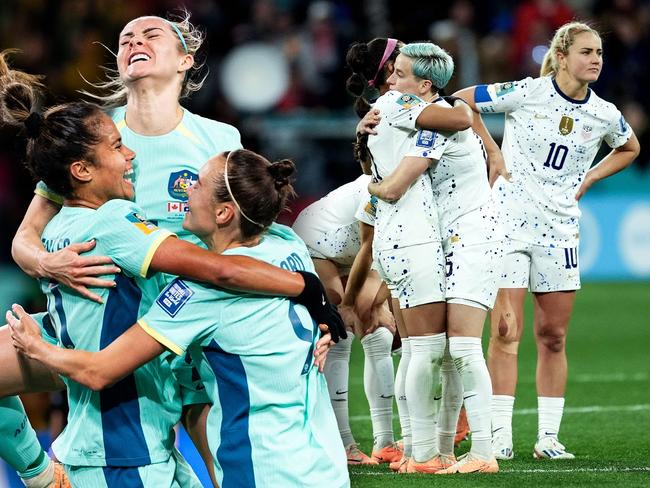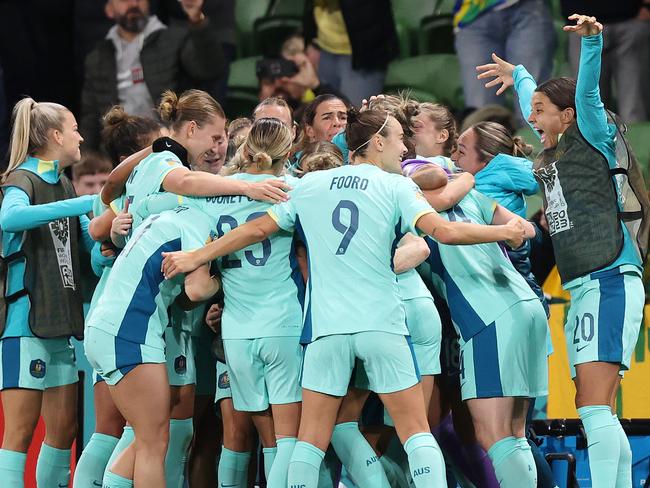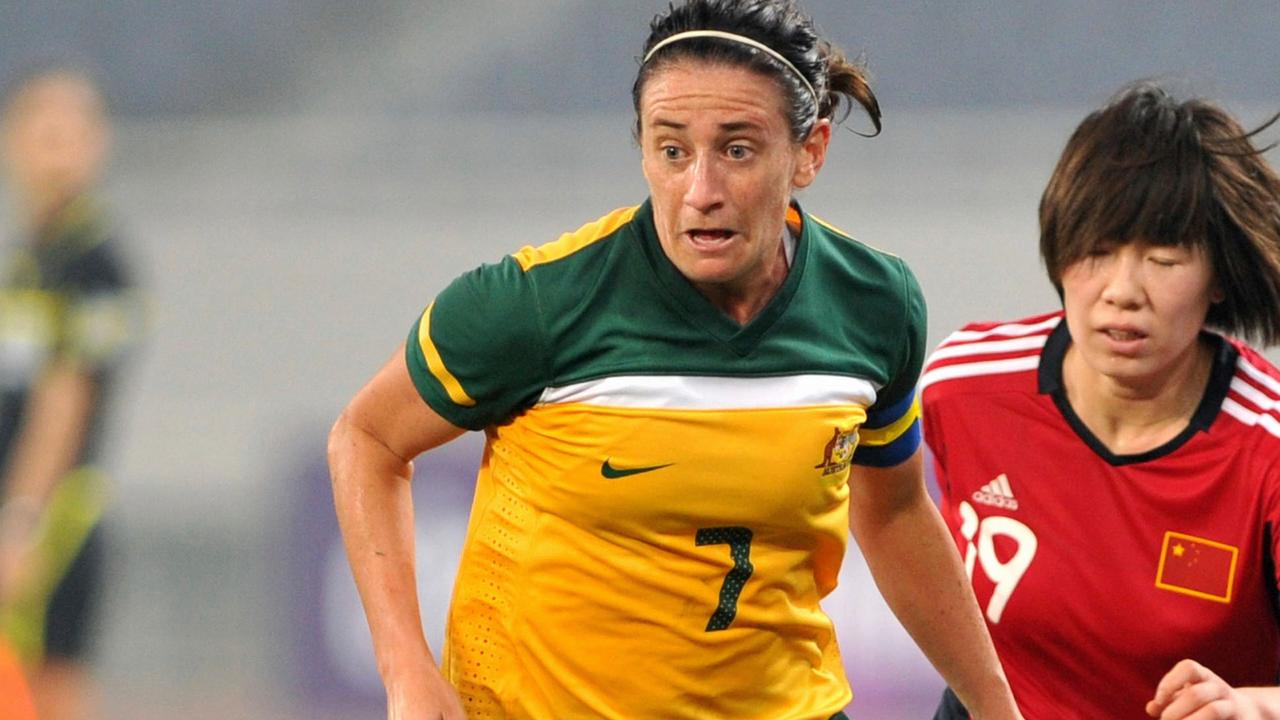Matildas v Denmark: Australia’s World Cup hopes rise as rivals fall, stars return and strategic plan hits top gear
A week ago, the Matildas faced a grim first round exit. Now they are a genuine chance to make history. ADAM PEACOCK explains why.

One week is an eternity at this World Cup.
Just a few days ago the USA and Germany appeared destined to dominate, Brazil threatened and the Matildas, with key players missing and a dispiriting loss to Nigeria, were a game away from missing the tournament’s knockout stages for the first time since 2003.
Now fast forward to today.
USA, Germany and Brazil – ranked No. 1, 2 and 8 respectively – are out.
The Matildas?
They’re a genuine chance to win it all.
Key players are returning, Sam is smiling and a breathtaking 4-0 win over Olympic champions and world No. 7 Canada restored team confidence and hope for the millions upon millions now aboard this big, beautiful bandwagon.
Vibes are great – as is the fact that only one remaining nation, Japan (2011), has lifted the World Cup before – but these are ultimately meaningless for the Matildas without method. And in Australia’s case, their clear strategy to advance is both crystal clear and compelling.
Speed.

The Matildas’ live to accelerate and skewer.
The Canadians couldn’t cope with it – and they are not alone.
An analysis of every Matildas goal scored in 2023 is revealing in this regard.
In all, they have scored 20 goals this year with eight of them coming from set pieces – corners or penalties. Eleven of the remaining 12, meanwhile, rely on charging forward with relentless speed, as if trying to outrun their shadow.
Those 11 goals have been scored after an average of three passes in the opposition half. Once over halfway it’s pass, pass, pass … goal.
No tiki taka here.
THREE PASS PATTERN
The style was there for all to see in the crucial 4-0 win over Canada last Monday in Melbourne. The opener came when Steph Catley was released into fresh air down the right to cross for Hayley Raso, who neatly converted.
The third goal, scored by Mary Fowler, came off Caitlin Foord latching onto a long pass down the left flank, isolating her defender and putting the shimmy-shimmy shake on before crossing to Fowler.
The average of three passes per goal stretches back to February and the Cup of Nations tournament that Tony Gustavsson used as a full dress rehearsal for the moments we’re seeing now.
The opening goal in the first game in a 4-0 win over Czechia was a Raso finish off the back of three passes in the opposition half. Only once has the threshold three-pass average been exceeded when the Matildas combined for an outrageous ten passes before their third goal in that same win over Czechia in Gosford.

Teams have prepared plans to mitigate the tactic. Nigeria, for instance, matched Cortnee Vine and Raso for pace with athletic fullbacks and sat deeper to allow less space to run into.
Nigeria then took full advantage of their limited chances to secure a shock 3-2 win.
The majority of the big guns left in the tournament won’t play like Nigeria, preferring to stick to their own strengths. And this raises hope the Matildas can indeed give this tournament an almighty shake.
But, like anything in football – chess played with real life bishops and queens – a strength can also be a weakness if you’re not careful.
FAST, FURIOUS, FABULOUS
“Rest defence” is one of those terms coaches love.
Translation: when a team has the ball, defenders take positional precautions to ensure they don’t get smacked between the eyes if possession is suddenly lost.
Gustavsson has a clear rule in this regard.
If Foord or Raso are travelling at the speed of the light down the flanks, or Sam Kerr is doing the same (when fit) centrally, defenders and central midfielders left in the vapour trail must charge forward at the same pace to compress the pitch.
On Monday, this was apparent at ground level. Every time the Matildas seared Canada in transition, Clare Hunt and Alanna Kennedy would sprint, screaming like banshees to communicate the need to push up and restrict any space the Canadians could ultilise if the ball was turned over.
This is not a new concept to the Matildas, although there have been subtle changes in the last two World Cup cycles. Alen Stajcic, Ante Milicic and Gustavsson have all recognised the Matildas’ undoubted strength, but employed slightly differing methods to mitigate against it becoming a point of vulnerability.
When Milicic took over in 2019, he tried to alter the Matildas’ reliance on charging forward at every opportunity and get the players to consider their choices when in possession.
Due to the ill-timed – and objectively wrong – sacking of Stajcic, Milicic only had six months to implement the idea. Ultimately, it wasn’t enough time, although the crazy end-to-end group stage game against Brazil did result in a stirring victory.

Gustavsson, who started in 2021, has allowed the Matildas to shift back to the lightning quick charges, as long as defenders and the two deep midfielders remain vigilant with their positioning at all times.
The tactic places immense physical pressure on the midfield duo of Katrina Gorry and Kyra Cooney-Cross. They have coped so far. The pair were superb against Canada, covering an enormous amount of ground, much of it at high intensity, to consistently stop Canada from countering the Matildas’ attacks.
In Gorry, the Matildas have their heartbeat and in Cooney Cross, they appear to have a generational player, athletic enough to handle the physical extremes her position demands and with excellent technique to boot. No wonder clubs in England are clamouring for her signature.
A seven-day break before the Denmark game will do wonders for Cooney-Cross and Gorry, but they should not get used to it. Should the Matildas make the final, they will play four games in 13 days from the Denmark game.
DANISH THREAT
The Matildas’ brains trust is not looking beyond the challenge of the No. 13 ranked Danes as their manager, Lars Sondergaard, is a shrewd thinker and his players have the discipline to adhere to a plan.
Denmark’s group game against England should serve as a warning.
England dominated the first half-hour and jumped to a deserved 1-0 lead. But the match turned and the Danes gradually frustrated England, unsettling a smooth passing game. They were unlucky not to get a point with a late header only stopped by the post.
When the Matildas walk out against Denmark, only 10 other teams will still be standing in the tournament. Extraordinarily, top 10 nations USA, Germany, Canada and Brazil are already flying home. And of the big guns remaining, the Australians have defeated England (April), France (July), Spain (February) and Jamaica (February) this year and Sweden in November, 2022.
None can match the Matildas for across-the-board pace.
And Australia has the nation in its corner.
History tells us host countries face a challenge lifting the women’s World Cup. Indeed, only the USA in 1999 has done it. But with the pressure of missing the knockout phase gone, key players returning and a clear plan to dismantle the opposition, there is a genuine, rising belief that the Matildas are poised for a historic charge.




